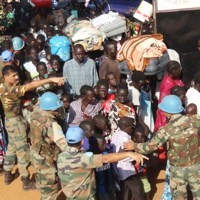The deadly conflict in South Sudan, itself the culmination of a long-running power struggle within the ruling Sudan People’s Liberation Movement, is increasingly drawing in neighboring countries driven by disparate security and economic interests, further complicating the crisis and efforts to reach a resolution.
The U.N. has accused both sides of South Sudan’s split of committing human rights abuses in the conflict, which has so far claimed an unknown number of lives, displaced an estimated 900,000 people both inside and outside the country and shows no signs of letting up. An agreement to cease hostilities was violated even before its ink dried, jeopardizing an already faltering mediation process led by the Intergovernmental Authority on Development (IGAD) in Addis Ababa, Ethiopia.
Uganda was the first of South Sudan’s neighbors to intervene militarily, sending an estimated 4,500 soldiers to the country within four days of the outbreak of fighting there on Dec. 15. Uganda was compelled, Kampala insists, by a distress call from South Sudan’s embattled President Salva Kiir and requests from the U.N., Washington and London to step in.

